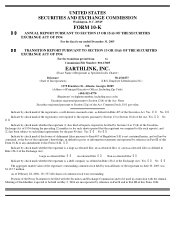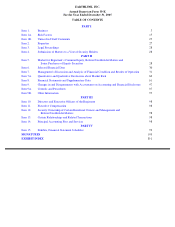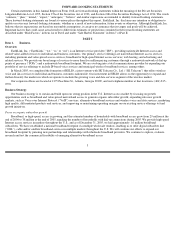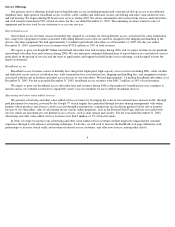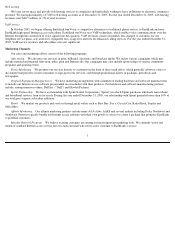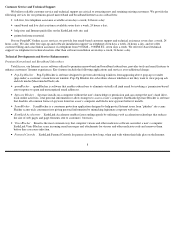Earthlink 2005 Annual Report Download - page 12
Download and view the complete annual report
Please find page 12 of the 2005 Earthlink annual report below. You can navigate through the pages in the report by either clicking on the pages listed below, or by using the keyword search tool below to find specific information within the annual report.
impose increased fees and administrative and regulatory burdens on VoIP providers that could adversely affect VoIP services. The FCC has
already required VoIP providers to meet certain emergency service requirements (such as “E911”) that require VoIP providers to provide E911
capability to nomadic VoIP services. The FCC may impose additional E911 requirements that could result in substantial costs incurred by VoIP
providers depending upon technical capability requirements. The FCC is also considering imposing disability access requirements, consumer
protection requirements, number assignment and portability requirements, and interception or wiretapping requirements, such as the
Communications Assistance for Law Enforcement Act. Such regulations could result in substantial costs depending on the technical changes
required to accommodate the requirements, and any increased costs could erode our pricing advantage over competing forms of
communication.
Broadband Access
Broadband service access. We purchase last mile broadband access service from incumbent local exchange carriers (“ILECs”),
competitive local exchange carriers (“CLECs”) and cable providers. The term “last mile”
generally refers to the element of telecommunications
networks that is directly connected to homes and businesses. ILECs were previously required to make DSL-based broadband access service
available on a non-discriminatory basis to ISPs like us. However, an FCC order published in September 2005 reclassified wireline broadband
DSL services as information services and eliminated the FCC’s long-standing regulated access requirements. The FCC decision provides for a
one-year transition period ending in November 2006 for ISPs and others to negotiate access arrangements with ILECs that no longer choose to
offer wholesale broadband transmission services on a regulated basis. Our existing contracts with the ILECs are not affected by this order.
However, these newly adopted policies may affect our ability to extend or renew our current contracts with the ILECs at the same terms and
conditions and could adversely affect our ability to serve customers with DSL-based broadband access if we are unable to enter into acceptable
agreements.
Cable providers have generally resisted granting us wholesale access to their networks to provide high-speed access services and have
generally not been required by law to make access available to ISPs like us. In June 2005, the U.S. Supreme Court held that the FCC’s
conclusion that cable modem service is an end-to-end unregulated “information service” is a reasonable interpretation of the Communications
Act. Cable operators are thus not required to make last mile access available to ISPs on a non-discriminatory basis. The U.S. Supreme Court
noted the FCC has jurisdiction to require nondiscriminatory access and the FCC has a proceeding to consider whether it should do so. The U.S.
Supreme Court decision does not impact our existing agreements with cable wholesale broadband providers because contracts such as our
agreement with Time Warner Cable are not predicated on regulated access. Time Warner Cable makes last mile access available to us and other
ISPs as a condition of the AOL-Time Warner merger, and after taking over six of Time Warner Cable’s markets, Bright House Networks
continues to make access available to us. We also offer broadband Internet access over Comcast’
s cable network to customers in the Seattle and
Boston area markets.
While the long-term implications of the U.S. Supreme Court decision and the FCC’s decisions are not certain, they may adversely affect
our ability to execute our broadband strategy, our ability to sustain or grow our broadband access customer base and revenues, and our
profitability. We will continue our efforts to partner with wholesale broadband providers, including cable providers, ILECs, CLECs and
wireless providers, to expand our broadband footprint and the various technologies we can use in various markets to deliver our broadband
services. To this end, we are attempting to gain access to a larger number of cable systems over which we can offer our services and to
demonstrate our ability to deliver meaningful volumes of customers to our DSL and cable providers by continuing to actively grow our retail
broadband subscriber base. We continue to evaluate the commercial feasibility of emerging alternative broadband access technologies,
including broadband over power lines and other technologies, to gain further wholesale broadband access in order to create greater retail
broadband competition. We will also continue
11


